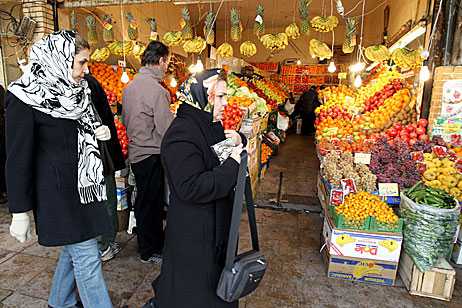Thomas Seibert
Jan 24, 2012

A bazaar in Tehran is laden with fruit, but as the western sanctions bite Iran may find international trade increasingly difficult.
ISTANBUL // Turkey yesterday criticised the decision by the European Union to impose an import ban on Iranian oil, but Ankara is unlikely to risk irritating western partners over the issue, analysts said.
“This will raise political tensions” in the region, Ibrahim Kalin, a foreign policy adviser to Recep Tayyip Erdogan, Turkey’s prime minister, said in a television interview. “Channels for negotiations have to remain open,” Mr Kalin told AHaber.
Mr Kalin called for new negotiations about Iran’s nuclear programme, which the EU and the US have said may have military purposes, a charge the Iranians deny. “The door is open,” Mr Kalin said about the readiness of Turkey, the only Muslim Nato member country, to host new talks between the West and Iran in Istanbul. The last effort ended without agreement.
Turkey has been arguing that, as a direct neighbour of Iran and important buyer of Iranian oil, it has a special interest in calming tensions in a region.
“Decreasing the tension in the region is also to Turkey’s benefit,” a Turkish official said. “That’s why we encourage everybody to find a diplomatic solution to the issue.”
Ankara said it will not take part in possible military strikes against Iranian nuclear sites that are reportedly being planned by Israel, a former partner of Turkey.
The Istanbul-based Cumhuriyet newspaper reported yesterday that the Turkish military was drawing up plans to prevent Israeli fighter planes from crossing Turkish airspace if there are bombing missions to Iran. There was no official comment from the defence ministry, but a Turkish diplomat said that “every country, every air force is entitled to monitor and defend its airspace”.
Taner Yildiz, Turkey’s energy minister, said this month that his country was not obliged to follow sanctions by the EU or the US against Iran. “For us, decisions taken outside the United Nations are not binding,” Mr Yildiz said. Turkish oil imports from Iran would continue.
As Iran supplies around a third of Turkish oil needs, a reduction of those imports could have dramatic consequences for Turkey’s thriving economy. Last week, Turkey and Iran said they were aiming to raise their bilateral trade to $30 billion (Dh110bn) a year by 2015 – twice the volume of today. Much of today’s trade is oil and gas from Iran to Turkey.
But days after the pledge to double bilateral trade, news reports said Turkey had begun to explore the possibility to raise oil imports from Saudi Arabia in an effort to lower its dependency on Iran. The Turkish government has not commented on the reports.
Commentary: Sanctions squeeze Iran, but the street isn’t suffering yet
Last Updated:Jan 24, 2012
The goal of US and EU sanctions against Iran’s central bank may be to economically cripple the country, but life on the ground suggests that still seems like wishful thinking.
Jason Rezaian
“Turkey says decisions by the US and the EU are not binding for itself, but ultimately Turkey will not side with Iran when it comes down to hard decisions,” Mehmet Sahin, a Middle East specialist at Ankara’s Gazi University, said yesterday.
Sercan Dogan, an analyst at the Centre for Middle Eastern Strategic Studies (Orsam), an Ankara-based think tank, also argued that Turkey had little choice but to go along with western efforts to increase Iran’s isolation.
“Turkey will not be able to withstand the US for long in this respect”, Mr Dogan wrote in an analysis for the Orsam webpage last week.
In 2010, Turkey raised eyebrows among its western partners when it presented a joint agreement with Brazil and Iran aimed at ending the nuclear row. The agreement was swiftly rejected by the EU and the US.
Since then, Ankara has demonstrated that its Nato membership and western alliances take priority over relations with Iran. Last year, Ankara angered Tehran by giving the green light for the installation of a radar system in Anatolia that forms part of Nato’s anti-missile shield.
Iran said the system’s real purpose was to protect Israel against counter-strikes after a possible attack on Iranian nuclear sites.
But Turkey stood by its decision despite sharp criticism from Iran and from parts of the opposition at home.
Some observers have warned that Iran is trying to use Ankara to buy more time in its stand-off with the West.
“Iran pushes Turkey in front of the international community whenever the international community puts pressure on it”, Emre Uslu, a columnist, wrote in the English-language Today’s Zaman newspaper last week.
“During these periods, Iran treats Turkey as if it is its closest ally and uses Turkey both as a fence to hide behind and as a gateway to weakening the international sanctions,” he wrote. A Turkish diplomat, asked for his reaction, dismissed Mr Uslu’s criticism. Trying to de-escalate the situation is in Turkey’s interest, he said.
via Reluctant Turkey ‘will join oil embargo’ on Iran – The National.